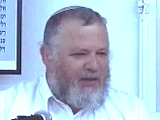667
Question #1: Is it Shabbos versus Rosh Chodesh?
"When Rosh Chodesh begins on motza’ei Shabbos, do I say Yaaleh Veyavo in bensching at seudah shelishis?"
Question #2: Why is this night of Chanukah different from all other nights?
"Chanukah begins this motza’ei Shabbos. If I finish seudah shelishis after nightfall, do I include Al Hanissim in bensching?"
Introduction
When we recite Birkas Hamazon on Shabbos, Yom Tov, Chol Hamoed, Rosh Chodesh, Chanukah and Purim, we include special prayers to commemorate the holiday: on Shabbos, a passage beginning with the word Retzei; on Yom Tov, Chol Hamoed and Rosh Chodesh, the opening words are Yaaleh Veyavo; and on Chanukah and Purim, Al Hanissim.
In a different article, I discussed whether one recites these additions when one’s meal was divided between a holiday and a weekday – i.e., one ate part of his meal on the holiday and part before or after; or when the change of date transpired between the eating of the meal and the bensching. Does one recite the special addition to commemorate the holiday when this happens, or does one omit it? We discovered that there are several opinions as to what to do. These are the earliest opinions that I found:
1. When one bensches
The Rosh rules that one recites the version of Birkas Hamazon appropriate to when one bensches, regardless as to when one ate the meal. In his opinion, one who finished seudah shelishis after nightfall does not recite Retzei. Similarly, one whose Purim seudah ends after Purim does not recite Al Hanissim. The Rosh also holds that someone who completed a meal before Rosh Chodesh and bensches after it is dark should recite Yaaleh Veyavo.
2. The beginning of the meal
The Maharam, as understood by the Bach and the Aruch Hashulchan, maintains that the text of the bensching is established according to what was correct when the meal began . Therefore, one who finished seudah shelishis after nightfall recites Retzei, since his meal began on Shabbos. (There is an exception – if he did something to declare that Shabbos is over, such as reciting havdalah, davening maariv, or even simply answering borchu, he does not recite Retzei any more, as it is therefore inconsistent to mention Shabbos in bensching.)
3. All of the above
The Maharam, as understood by the Taz, contends that one adds the special prayer if either the meal began on the holiday or one is bensching on the holiday. Thus, one who finished seudah shelishis after nightfall recites Retzei, and someone who completed a meal before Rosh Chodesh and bensches after it is dark should recite Yaaleh Veyavo.
The halachic conclusion
The halachic consensus regarding someone who began his meal on Shabbos or Purim and continued it into the night is that one recites Retzei or Al Hanissim, following the position of the Maharam and not the Rosh.
Conflicting prayers
The topic of our current article adds a new aspect to this question – what to do when Rosh Chodesh or Chanukah begins on motza’ei Shabbos, and seudah shelishis started on Shabbos and was completed on Rosh Chodesh or on Chanukah. According to the Rosh, one should recite Yaaleh Veyavo or Al Hanissim, whether or not one ate on Rosh Chodesh or on Chanukah. However, the consensus of halachic opinion is that the Maharam’s opinion is accepted, in this topic, over that of the Rosh. According to those who understand that the Maharam ruled that one should always recite the text of Birkas Hamazon appropriate to the beginning of the meal, one should recite Retzei. Yet, many authorities follow the second interpretation of the Maharam mentioned above, that one adds the special prayer if either the meal began on the holiday or one is bensching on the holiday. What complicates our question is that there may be a requirement to recite both Retzei and either Yaaleh Veyavo or Al Hanissim, yet mentioning both in the same bensching might be contradictory in this instance, since the holiday begins after Shabbos ends. As we will soon see, whether or not this is a problem is, itself, debated by the authorities.
The earliest authority that I found who discusses this predicament is the Bach (end of Orach Chayim, 188). Regarding what to recite when seudah shelishis continues into Rosh Chodesh, he concludes that one should say Retzei and not Yaaleh Veyavo, because the beginning of a meal determines the exact text of its Birkas Hamazon. As I mentioned above, this is precisely the way the Bach understands the Maharam’s position – that the proper bensching is always determined by the beginning of the meal. Since the halacha follows the Maharam’s position, the Bach comfortably rules according to his understanding of the Maharam, that one recites Retzei and not Yaaleh Veyavo.
The Magen Avraham (188:18; 419:1) analyzes the issue differently from the way the Bach does. First, he considers the possibility that one can recite both Retzei and Yaaleh Veyavo. This is based on his understanding of the Maharam’s position that ending a meal on Rosh Chodesh or a different festival is reason to recite the holiday additions, even if the meal started on a weekday. However, the Magen Avraham concludes that one cannot recite both Retzei and Yaaleh Veyavo in this instance, because this is an inherent contradiction: If it is already Rosh Chodesh, it is no longer Shabbos, and if it is still Shabbos, it is not yet Rosh Chodesh. Since this is now a conundrum, the Magen Avraham concludes that one should follow the Rosh’s opinion, that one recites whatever is appropriate to be said at this moment, which means to recite only Yaaleh Veyavo. Magen Avraham contends that this practice is followed only when one ate bread on Rosh Chodesh. If he did not eat bread on Rosh Chodesh, then he should say only Retzei, following the Maharam’s opinion that the special prayers are determined by the beginning of the meal.
Chanukah on motza’ei Shabbos
The Magen Avraham also rules that there is a difference in halachah between Rosh Chodesh and Chanukah. When Chanukah begins on motza’ei Shabbos and seudah shelishis extended into the beginning of Chanukah, he rules that one should recite only Retzei and not Al Hanissim, even if he ate bread on Chanukah.
Why is Chanukah different from all other nights?
The Magen Avraham explains that, whereas when reciting Yaaleh Veyavo on a weekday Rosh Chodesh bensching is required, reciting Al Hanissim in bensching of a weekday Chanukah is technically not required, but optional. Therefore, when his meal began on Shabbos (which was as yet not Chanukah) and he is, therefore, required to recite Retzei, even if he continued the meal into Chanukah and ate bread then, the optional addition of Al Hanissim does not cancel the requirement to recite Retzei.
More opinions
Thus far, we have seen two opinions concerning what to do for the bensching of a seudah shelishis that extended into Rosh Chodesh that begins on motza’ei Shabbos:
(1) The Bach, that one should recite Retzei and not Yaaleh Veyavo.
(2) The Magen Avraham, that if he ate bread on motza’ei Shabbos he should recite Yaaleh Veyavo, but otherwise he should recite Retzei.
A third position is that, once it is Rosh Chodesh, one should recite Yaaleh Veyavo and not Retzei (Maharash of Lublin, quoted by Shelah and Taz 188:7). The Maharash maintains that since at the time he bensches it is Rosh Chodesh, the requirement to recite Yaaleh Veyavo is primary and preempts the requirement to recite Retzei, which he considers to be secondary, since it is no longer Shabbos.
Why not both?
The Taz (188:7) disagrees with all the above-mentioned positions, challenging the assumption that one cannot recite both Retzei and Yaaleh Veyavo. He concludes that since Yaaleh Veyavo is recited after Retzei there is no contradiction, since Rosh Chodesh begins after Shabbos ends. Therefore, one who ate on Shabbos and is bensching on Rosh Chodesh should recite both additions.
To sum up, someone whose meal began on Shabbos and is bensching on Rosh Chodesh, should:
recite Yaaleh Veyavo, according to both the opinion of the Rosh and that of the Maharash,.
recite Retzei, according to the opinion shared by the Bach and the Aruch Hashulchan.
recite both Retzei and Yaaleh Veyavo, according to the conclusion of the Taz,.
According to the ruling of the Magen Avraham, if he ate bread after Rosh Chodesh arrived, he should recite Yaaleh Veyavo. If he did not, he should recite Retzei.
Rabbi, what should I do?
The Mishnah Berurah (188:33), when recording what to do, implies that one should follow the position of the Magen Avraham. He then mentions the Taz as an alternative approach – that one should say both Retzei and Yaaleh Veyavo. This is consistent with the Mishnah Berurah’s general approach of following the Magen Avraham, except when the latter’s position is opposed by most later authorities.
The Aruch Hashulchan, on the other hand, concludes neither as the Magen Avraham nor the Taz, but that what one recites is always determined by the beginning of the meal. Therefore, in this situation, he rules to recite Retzei and omit Yaaleh Veyavo, regardless of whether one ate on Rosh Chodesh.
Since there are many conflicting positions as to which additions to recite when Rosh Chodesh begins on motza’ei Shabbos, many people avoid eating bread after nightfall. They eat all the bread that they intend to eat towards the beginning of the meal, and upon completing the seudah, recite bensching including Retzei and omitting Yaaleh Veyavo. This approach follows the majority of halachic authorities (Bach, Magen Avraham, Aruch Hashulchan, Mishnah Berurah [according to his primary approach]), although it runs counter to the opinions of the Maharash and the Taz. Those who want to avoid any question recite Birkas Hamazon before the arrival of Rosh Chodesh.
Conclusion
In our daily lives, our hearts should be full with thanks to Hashem for all He does for us. Birkas Hamazon provides a regular opportunity to elicit deep feelings of gratitude for what Hashem has done in the past and does in the present. All the more so should we should acknowledge Hashem’s help on special holidays.
This Shiur is published also at Rabbi Kaganof's site

"...but he could not become warm."
Rabbi Shimon Klein | 5761

"...but he could not become warm."
Rabbi Shimon Klein | 5761

On Jewish Character
Pekudei 5779
Rabbi Jonathan Sacks | Adar I 30 5779






